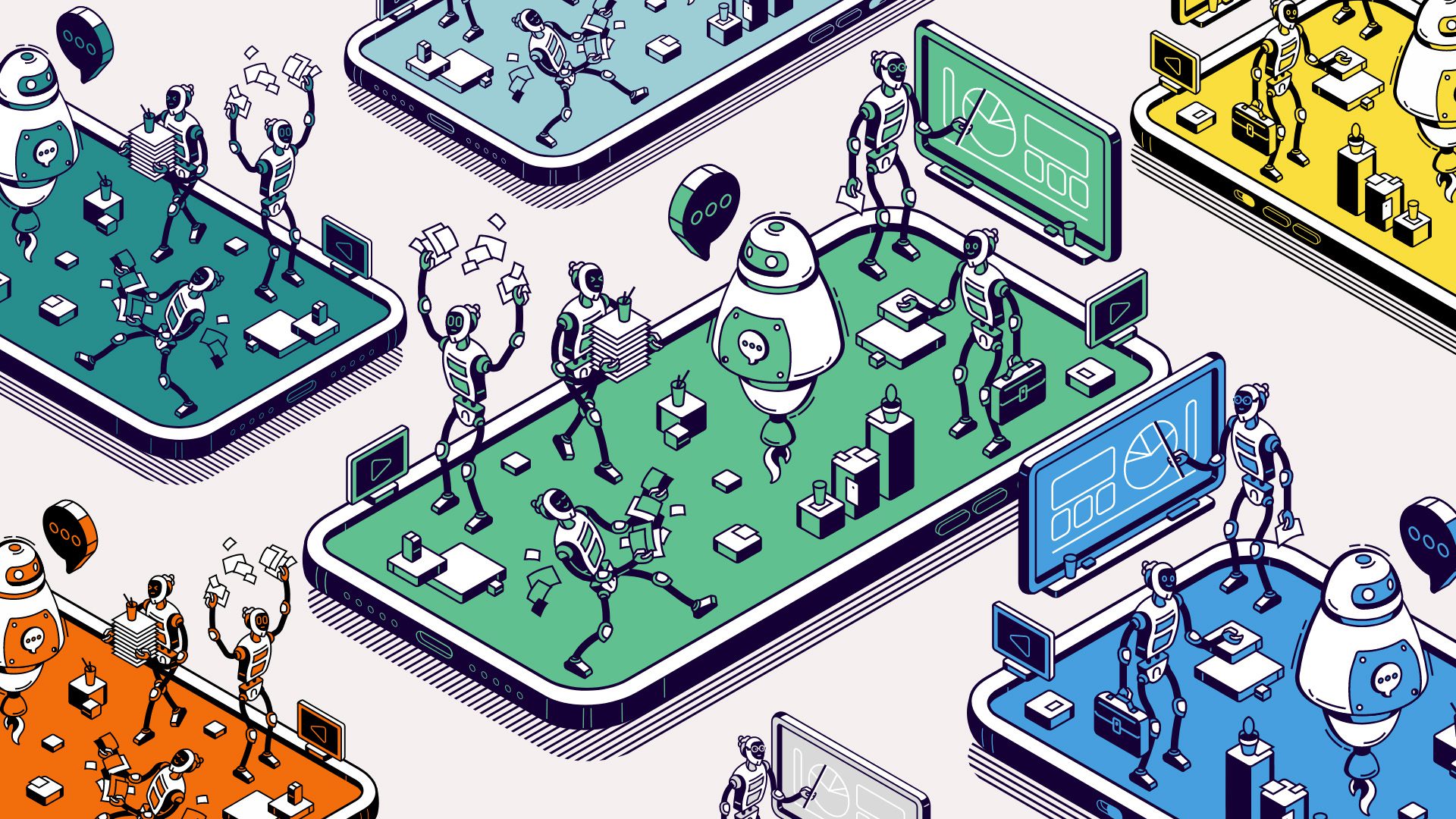Technology
The rapid emergence of new technologies offers tremendous benefits, but few organizations are reaping their full potential. The competitiveness of nations, industries, and companies will hinge on the capacity to transform through waves of innovation, as leaders navigate AI competitiveness, deep tech, metaverse, AI & society, systemic trust, the data economy, bionic customer interactions, and digital hegemony.
AI CompetitivenessView All
How can companies and governments unlock the full benefits of AI to build competitive advantage?
AI Empowers Employees, Not Just Companies
Our recent survey shows that using artificial intelligence at work benefits both organizations and employees. Increasing employee awareness, trust, and understanding of AI further enhances its value.
You Can Now Put A.I. Tools In The Hands of All Your Employees. But Should You?
If they’re used indiscriminately, no-code/low-code platforms for A.I. are likely to end up doing more harm than good.
Getting The Balance Right—3 Keys To Perfecting The Human-A.I. Combination For Your Business
In the age of AI where algorithms continuously improve through interaction and mutual learning with humans, companies must realize that their AI efforts won’t be optimal if they only focus on the technology or humans. They need to combine both.
What do Starbucks, Tesla, and John Deere have in common? They’ve used A.I. to reinvent their businesses
Reinventing business with A.I. is no longer a hypothetical proposition; in the age of A.I., that may be the only way for every organization to thrive.
China’s Business ‘Ecosystems’ Are Helping It Win The Global A.I. Race
The way governments, institutions, and companies—the triple helix of business innovation—interact influences an ecosystem’s formation, especially when an entire nation treats a technology as a strategic priority.
AI & SocietyView All
AI can be a critical lever to both solve and heighten societal challenges. How can we ensure that it creates a positive impact?
Getting The Balance Right—3 Keys To Perfecting The Human-A.I. Combination For Your Business
In the age of AI where algorithms continuously improve through interaction and mutual learning with humans, companies must realize that their AI efforts won’t be optimal if they only focus on the technology or humans. They need to combine both.
AI Regulation Is Coming
As firms embed more and more artificial intelligence in products and processes, attention is shifting to the potential for algorithms to make bad or biased decisions. Inevitably, many governments will feel regulation is essential to protect consumers. In a new article published by Harvard Business Review, we look into how this regulation might take shape and what it means for companies.
Expanding A.I’s Impact With Organizational Learning
In order to see significant financial returns, organizations need a multidimensional, complex relationship with AI—one that involves several methods of learning and different modes of interaction.
The Rise of the AI-Powered Company in the Post-Crisis World
Shifts in global supply chains, changing consumption patterns, and the increasing prevalence of remote ways of working—trends that were underway long before the COVID-19 crisis—will accelerate. AI can help companies thrive in this new environment.
Deep TechView All
Explore emerging transformational technologies beyond AI and their potential impact on businesses.
Can Europe Catch Up with the US (and China) in Quantum Computing?
Because the technology will profoundly disrupt global business, government, and military networks, achieving quantum sovereignty is a critical task for the EU.
‘Deep Tech’ Has Become One Of The Most Powerful Use Cases For A.I. In Business. Here Are 3 Keys To Making It Work
Deep Tech is catalyzing groundbreaking innovations faster than ever. Having established its reputation as a problem-driven approach to tackle complex problems by combining new physical technologies with sophisticated digital technologies, it is inevitable that Deep Tech will disrupt incumbents in almost every industry.
What CEOs Need to Know About Deep Tech
Advanced technologies will bring big changes. Which companies will be ready to capitalize?
Synthetic Biology Is About to Disrupt Your Industry
Synthetic biology technologies are finally maturing, becoming the way almost anything can be manufactured competitively and sustainably. Business must learn to use syn-bio to develop new products and processes, improve existing ones, and reduce costs to remain competitive in the future.
Systemic TrustView All
In the digital era, the demand for trust is skyrocketing. How can a company design a digital architecture to build trust among its stakeholders?
What AI Reveals About Trust in the World’s Largest Companies
BCG’s AI-based Trust Index enables companies to break down stakeholder perceptions of their trustworthiness. Analyses based on the Index have yielded valuable insights about what builds, sustains, or destroys trust.
Why Trust Should Be Part of the Antitrust Conversation
Regulators are turning up the heat on digital platforms, but traditional remedies are clearly not adequate. Viewing antitrust through the lens of trust may provide answers.
Beyond Blockchain: The Promise of Digital Trust Networks
In the digital era, the demand for trust is skyrocketing. So how does a company design a digital architecture to build trust among its stakeholders?
Vibrant Cities Are Built on Trust
Cities that forge trust with their residents are on the right track to a sustainable future. What does it take?
7 Tools for Building a Business People Trust
Why do we trust some companies and not others?
Building Trust in Business Ecosystems
Winning companies use a multifaceted framework to build trust into their ecosystem operations from the very outset.
Bionic Customer InteractionsView All
Consumer preferences are rapidly evolving with the emergence of new technologies. What could the future of consumer interaction look like?
High-Tech Touchpoints Are Changing Customer Experience
We see three opportunities for business leaders who want to enhance their companies’ CX and drive greater satisfaction. First, focus on frictionless commerce. Second, consider augmented experiences. Finally, emphasize intuitive interactions.
Touchpoints and the Revolution in Omnichannel
Touchpoint-centric engagement could unleash massive value for customers and businesses. Taking just a few key steps will help companies reap the rewards.
The Declining Relevance of Humans in Delivering What Customers Want
Retailers and service providers should rethink where and how they deploy their sales agents in light of data that shows current approaches aren’t delivering the experiences consumers want.
Siri, Alexa, Google…What comes Next?
What will the next generation of digital helpers look like? BCG Henderson Institute Fellow Karen Lellouche Tordjman breaks down the two critical challenges engineers need to crack before they can usher in a new age of smart voice assistants
The New Consumer Conversation in an Era of Uncertainty
Consumer preferences are changing rapidly, outpacing companies’ traditional abilities to track and respond to trends. Data and AI can provide new eyes and ears.
Digital HegemonyView All
Two centers of gravity govern today’s digital world: the US and China. Will these centers hold, or will the gains be more widely distributed?
Developing an Artificial Intelligence for Africa strategy
African companies need to create an environment in which AI can take root, ensure access to data, infrastructure, and licenses, and grow AI talent in order to strengthen the AI ecosystem in the continent.
Europe is missing out on the A.I. revolution—but it isn’t too late to catch up
Europe is at a crossroads. Missing today’s opportunity to digitize its industry with A.I. will have grave consequences for the continent’s long-term competitiveness, and for local employment. Immediate action is needed.
Europe Can Catch Up in AI, But Must Act — Today
Its leaders must quickly implement policy reforms that will enable EU companies to deploy AI at scale.
As COVID-19 Crisis Reveals, Europe Urgently Needs to Digitize its Industry
Industrial players have no time to lose. They need to catch up in digital by committing to a dramatic transformation.
Are China’s Digital Companies Ready to Go Global?
More and more are confident that they have the expertise, technological capabilities, and financial resources to succeed outside their home market.
Get Ready for the Chinese Internet’s Next Chapter
Now that the country’s major online players have conquered the consumer space, they’re intent on digitizing B2B industries and building platform-based businesses.
Data EconomyView All
While many companies are well underway on their digital journeys, most organizations have yet to realize their data’s full potential.
Three Ways Your Company’s Data Can Jump-Start Climate Action
Many companies are still wary of sharing data that could expose them to risk and diminish their competitive advantage. What if uniting towards a common goal could help them overcome these fears?
Making Technology Transformation Competitively Relevant
Realizing the promise of digital and gaining a sustainable advantage takes much more than investments in technology. Companies need to expand their capabilities of perception, cognition, and sociality to discover and exploit hidden relationships.
The New Tech Tools in Data Sharing
A complex marketplace is taking shape. Corporate management teams with data-sharing interests need to get up to speed.
Where Is Data Sharing Headed?
Most large companies are migrating at least some of their data and IT infrastructure to cloud services provided by so-called hyperscalers, such as Amazon Web Services and Microsoft Azure.
How Far Can Your Data Go?
How should companies think about use cases that are distant, unknown, or do not yet exist?
Generative AIView All
Look beyond today’s hype—to a future (perhaps quite near) in which Generative AI systems play a critical role in business and society.
How People Can Create—and Destroy—Value with Generative AI
A first-of-its-kind scientific experiment finds that people mistrust generative AI in areas where it can contribute massive value and trust it too much where the technology isn’t competent.
Why We Need to Be Realistic About Generative AI’s Economic Impact
Technology’s impact on productivity growth has been consistently overstated — are analysts repeating that mistake with generative AI?
Measured Enthusiasm
Is generative AI as “strategic” as it is claimed to be?
How CEOs Can Evaluate New Generative AI Models
As GPT-4 and other new models are released, leaders need to constantly assess the implications for their business.
The CEO’s Guide to the Generative AI Revolution
This powerful technology has the potential to disrupt nearly every industry, promising both competitive advantage and creative destruction. Here’s how to strategize for that future.
How to Unlock Hidden Value from Generative AI
Prompt engineering is only the beginning—it’s time to start experimenting.
What ChatGPT Reveals About the Urgent Need for Responsible AI
As Generative AI democratizes adoption, new challenges loom for organizations.
ChatGPT Will Change Many Things—But It Won’t Change Everything
When adopting Generative AI, don’t forget the fundamentals.
What ChatGPT Really Means for the Future of Business
The viral chatbot’s underlying technology will democratize AI and disrupt industries.













































